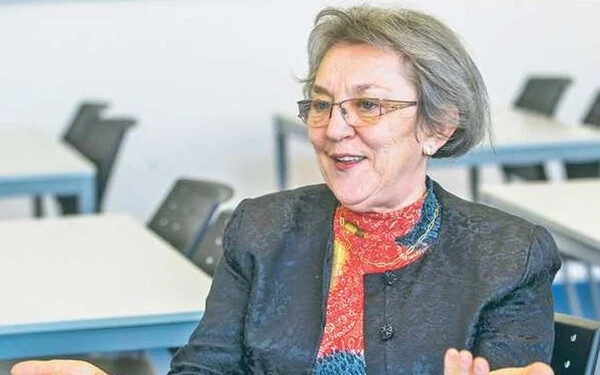The name of psychologist Terézia Strédl is well known in the Highlands. For thirty years, he worked in the pedagogical-psychological consultancy in Galántá, where he helped many families cope with difficulties. He started teaching after the establishment of Selye János University. He has been at the chair ever since and tries to pass on his knowledge to young people. He recently received the Felvidéki Hungarian Pedagogic Award for his constant work. Interview.
If we go back to the beginning of your career, when you worked as a pedagogical consultant, what has changed in relation to children and parents?
I'm glad you didn't ask what I majored in. All the more so, because when I created the pedagogical-psychological consultant in Galántá, there wasn't really a way to do that. Right then and there, everyone was happy to come to the counseling center and talk to a Hungarian specialist. Fortunately for me, I received a kind of "polyhistory education" at the university and tried to expand my knowledge base. As a beginner, I also dealt with children, and later dealing with adolescents and young adults was no longer a problem. And of course it doesn't work without parents. Later, married couples also came, and I started family therapy. This was really effective, as I realized that it would be useless to deal with the child if I do not touch the structure of the family. And sometimes even the school had to be involved. And what has changed?
More and more parents became problematic, because the parent willy-nilly transfers his dissatisfaction - personal, partner, workplace - to the child.
Unfortunately, there are more and more sad children these days. At that time, in the Új Ifjúság weekly newspaper - between 1979 and 2002 - I wrote the psychologist's answers section and through that I also experienced that our children and young people are full of half- and misinformation. I tried to remedy these, to put them right, and this provided a kind of insight. To this day, people come to me for advice, which - I admit with a little blush, I don't always win anymore. I try to pass on the knowledge and experience to the teachers. I just came home from Sajógömör today, I attended the school there.
This IT frenzy, this accelerated squirrel wheel and performance pressure in which we live, I see, has an extremely negative effect on the mental world of our children. Covid just hit all of this with a good shovel.
A school director recently calculated that during the two years children lost 40 percent of their knowledge, that much they forgot. But that's not what's important to me. But the fact that they stopped being together for a long time, hanging out in gangs, playing together in the yard, confessing their love to each other or holding talk shows. It is still possible to make up for the missing or dropped school material, but the consequences of the lack of social interaction are much more difficult to remedy.
Shocking statistics are emerging recently. The tendency to commit suicide has doubled in the case of children and adolescents, the emergency lines are on fire. What happened to the youth?
If we only look at Hungarian statistics, they are world leaders in terms of the number of suicide attempts among young people. The problem is that there are too many changes. The experts are already saying that uncertainty must be included in the survival package of the 21st century. But then where does the child get the handrails? In fact, this should be reported to them by the adults, their parents. But we ourselves are uncertain. We are living through a period full of serious crises. No one can say when the war will end, when bread will be cheaper... All new things increase stress and anxiety, and the level of this is already very high in children as well. And for the university age group, among whom we conducted a survey, it was not by chance that exam pressure ranked first among the frustrating factors.
Konrad Lorenz already said in 1970 that the fuel of today's man is fear.
That he might not be able to meet some expectation. What can only be compounded by family problems. It was ranked second among university students. Financial problems were listed in third place, and partner relationship problems were only "finished" in fourth place, although we expected it to be in second place.
Do they think that depression is one of today's cancer?
For a long time, we thought that depression was only an adult "naughtiness", but today it has become clear that it is not only a case of children. There are too many sad children these days. Personality is formed in the first six years. We benefit from this throughout our lives. In such cases, stability and a harmonious family are very important.
How many young people promise that they will never drink alcohol, and then, when a serious crisis in their lives comes in their forties and fifties, they reach for alcohol. Why? Because they saw at home that this is how the tension can be resolved.
Today's children are under a lot of pressure to perform, which is often fostered by their parents. Sometimes we have to decide what we want. Should our child be smart, a real model child, or rather happy? Knowledge and happiness do not always go hand in hand. Which is more important?
Regarding the responsibility of parents, I am reminded that school enrollment has recently ended, and at this time many parents make the wrong decision by enrolling their child in a Slovak school. Why is mother tongue education important?
The child needs a natural environment for his harmonious development and unfolding. It is best if he goes to school together with his friends, with his kindergarten buddies. It is important that the school is located locally. The family-run small schools are very good, the child knows the road leading there, the teacher, the neighborhood. What is familiar gives him security. If, on the other hand, we place him in a completely new environment, moreover by changing the language, then we certainly do not give him wings to fly in the realm of numbers and letters... A child attending Hungarian school learns two literary languages and English, which can be a huge plus in his future life. Parents often make decisions in their own interest, from their own point of view and not in the interests of the child, when choosing a school.
For a Hungarian child, the Hungarian school is the optimal solution, from all points of view.
And I would even add that, especially in the first two grades, there should be teachers of the "hen" type, so that the child feels loved. Because what is a good school like? Where the parent is respected and the child is loved. By the way, emotional intelligence is much more important than we think, it affects 80 percent of vitality, while intellectual intelligence only affects 20 percent.
We live in the age of single-parent families, mosaic families, and families that are falling apart. Can we even talk about harmonious families?
In 2011, the divorce rate among the Hungarian population in Slovakia was higher than among the majority population. Fierceness, impatience, and failure to solve problems can lead to this. Among those who married for the second time, in another statistic, every fourth respondent said that their first marriage was better. But then why did he divorce? I missed the fight. What was broken, he threw away and replaced it again. He didn't try to fix it. But there is also a lack of commitment.
Behavioral researcher Mária Kopp said that Hungarians are inherently individualistic, so we assert our own interests. Cooperation and being in a team (family) must be learned from kindergarten.
The child has the right to see smiling parents. Coming from a family of five children, I learned communication and cooperation at home, because there was always someone to talk to. I didn't even need conflict resolution training, because my younger brother showed me what to do. Empathy also worked, everything had to be shared. We have brotherly love and a close relationship to this day, my brothers are my best friends.
We welcome mothers at the weekend. The question already arises, what are today's mothers like?
The world has changed a lot, you have to accept that. Some of today's mothers are over-controlled, they form the right to know everything better than their children. In this case, the child becomes an external controller, that is, he must always be told what to do right now. The other type is the neglectful one, in essence, it means that they just live next to each other with the child, but not together. In such a situation, the seedling becomes lonely, it may become self-righteous and behavioral problems may appear. It would be irresponsible to generalize, there are mothers with different personalities. Jenó Ranschburg was once asked if they teach so many things, why don't they also teach education, because it is so important. With his professional wisdom, he said that the recipe is as simple as this:
If parents want to raise good children, they should love each other.
If the child feels safe, he opens up and shares his problems with his parents, because he knows that they will not bite his head off if he has done something wrong. The truth, however, is that it is much easier to talk about it than to implement it. We pass on what we got from our parents. The early bond between mother and child is decisive. If for any reason this cannot develop, it cannot be replaced.
The full interview can be read HERE!
Featured image: Újsó













